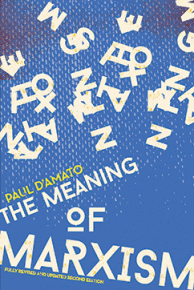A world of possibilities unleashed
has been a regular writer from the earliest issues of Socialist Worker. He has completed an expanded and updated version of his book The Meaning of Marxism. The book ends with a collection of answers to the most commonly voiced objections to socialism and Marxism. SW is serializing this section from The Meaning of Marxism--in the final installment, Paul argues that socialism would free everyone in society to pursue their dreams.
Socialism will make us all the same
Socialism will make us all like lemmings. This idea, "delicately stoked by the press and television of a capitalist society which is increasingly stamping sameness and conformity on its working people,"[84] was aided by images and stories of people in the so-called communist regimes. We saw people wearing identical clothing, schoolchildren mouthing slogans by rote to the great leader, work and leisure time regimented to the hour, row upon row of drearily identical buildings, the absence of any public debate, and so on.
But the system of totalitarian conformity that Stalin and Mao imposed in the Soviet Union and China respectively had nothing to do with socialism. Rather, it was part of a policy designed to regiment and dragoon the population, as the military does its soldiers, into making the maximum exertion for the purposes of building up industrial and military strength. This swift, blitzkrieg-style industrialization required strict labor discipline. Along with that went an ideology emphasizing national unity, and strict conformity to the dictates of the party bureaucracy, centered around a deified leader--the infamous cult of personality. "Thank you, Comrade Stalin, for our happy childhood," Russian students were required to say in class.[85] One Chinese official sang this "hymn of praise" to Chairman Mao at the 1955 National People's Congress: "The sun shines only in the day, the moon shines only at night. Only Chairman Mao is the sun that never sets."[86]
The irony of the Cold War is that the United States exhibited its own brand of stifling conformity, particularly in the 1950s. The climate of fear surrounding the anticommunist witch hunts, and the sterile clichés offered up by film, television, and advertising of suburban family life, sent a clear message that uniformity was paramount. Never mind that these images didn't really conform to reality. A 1957 novel expresses some of the frustration felt at the sameness of mass-produced suburban tract housing: "In any one of these new neighborhoods, be it in Hartford or Philadelphia, you can be certain all other houses will be precisely like yours, inhabited by people whose age, income, number of children, problems, habits, conversation, dress, possessions and perhaps even blood type are also precisely like yours."[87]
Mass-market capitalism imposes conformity on the majority. This is true both at work and outside work. At work, we are expected to follow strict rules about our time and behavior; and we are expected to follow a dress code. We churn out the same product or perform the same office tasks, day in and day out, with no letup, and we have very little control over the process. Outside of work, we are "mass consumers," coaxed, exhorted, and seduced into showing up in the millions to buy exactly the same product--which advertisers, ironically, often present to us as if we are making a unique choice that expresses our individuality. Hugo Boss encourages is to "Innovate, don't imitate." "There's no one way to do it," announces Levi's, which the last time I checked doesn't custom make most of its jeans.[88] Only the wealthy have the money and leisure to have palaces built by craftsmen, their clothes specially made, to send their kids to the best schools, and to take vacations to interesting places in private jets.
Paul D'Amato, author of The Meaning of Marxism, provides answers to the most common questions about socialism in this series excerpted from his book.The socialist answers
But it does not have to be this way. The alternative is not between two different brands of conformity. In a socialist society, the productive power of society is harnessed to serve everyone's needs. The collective provides the foundation of a flowering of creative expression and individual achievement. Think of it this way: In ancient Athens, the work of a few hundred thousand slaves provided about fifty thousand citizens with the freedom to meet, debate, and make decisions democratically. It allowed the flowering of great philosophy, theater, and art. Imagine now a society where the productive powers of society are so advanced that able-bodied people need only work a few hours every day to provide what is needed by society as a whole. In such a society--a socialist society--everyone will have the leisure time to pursue all sorts of dreams that today are out of reach to all but a minority. As Trotsky wrote:
Spiritual creativeness demands freedom. The very purpose of communism is to subject nature to technique and technique to plan, and compel the raw material to give unstintingly everything to man that he needs. Far more than that, its highest goal is to free finally and once and for all the creative forces of mankind from all pressure, limitation and humiliating dependence. Personal relations, science and art will not know any externally imposed "plan," nor even any shadow of compulsion. To what degree spiritual creativeness shall be individual or collective will depend entirely upon its creators.[89]
Notes
84. Foot, Why You Should Be a Socialist, chap. 3.
85. Quoted in Robert C. Tucker, Stalin in Power: The Revolution from Above, 1929-1941 (New York: Norton, 1990), 282.
86. Quoted in Ygael Gluckstein, Mao's China (Boston: Beacon Press, 1957), 379.
87. John Keats, The Crack in the Picture Window (New York: Houghton Mifflin, 1957), xi.
88. Thomas Frank and Matt Weiland, Commodify Your Dissent: Salvos from the Baffler, chap. 1.
89. Leon Trotsky, The Revolution Betrayed, 180.



